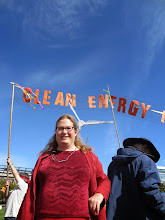Boulder, Colorado voters face a major question in November- who will provide electric power to city residents?
Last year, a 20-year contract with Xcel Energy expired. No new franchise contract was signed. Some residents and some city staff asked why Boulder couldn't create a municipal utility.
Colorado has 29 municipal utilities, providing 14 percent of the state's electricity.
Supporters of measures 2B and 2C are asking to move forward in the next steps toward creating a utility district. Voting yes allows the city to finalize costs and expenses. It does NOT lock the city into a more expensive option for electricity. Should start up costs and expenses be prohibitive, the move would cease. Supporters of 2B and 2C call these options off ramps.
The first question asks voters if the city should create a utility to provide electricity. Xcel would continue to provide natural gas.
The second question asks voters to extend and increase the utility occupation tax to fund start up costs of the utility.
A new utility, referred to as Boulder Power and Light during a League of Women Voters debate Sept. 21, would be required to meet Xcel's prices for electricity, called rate parity.
City staff estimated that the utility occupation tax extension would add 60 cents to a bill using 490kwh.
The Solar Gardens Institute endorses a YES vote on both 2B and 2C so that Boulder, with its history of environmental thinking, can decide the mix of renewable and fossil fuels for the best benefit of the community and community sensibilities.
YES votes allow Boulder a better negotiating position with Xcel. Many rural electric cooperatives in Colorado purchase electricity from investor owned utilities including Xcel.
If BP&L moves forward to buy the poles and wires of the distribution system within Boulder, the utility could purchase power from multiple sources, dictating the fuel mix. Conceivably, Boulder could well exceed state requirements for renewable energy laid on investor-owned utilities.
One correction we at SGI have to a comment made by David Miller during the Sept. 21 debate is that solar gardens would not go away in Boulder.
The Colorado Solar Gardens Act states that investor-owned utilities must extend similar benefits to solar gardeners. That equates to Solar Rewards, a project Xcel is revamping.
We expect that Boulder, which took the lead in zoning changes for solar gardens, would continue to support solar gardens within a municipal utility.
Friday, September 23, 2011
Support 2B and 2C in Boulder, Colo. (municipal utilities)
Labels:
2B,
2C,
Boulder,
municipal utilities,
renewable energy
Subscribe to:
Post Comments (Atom)


No comments:
Post a Comment